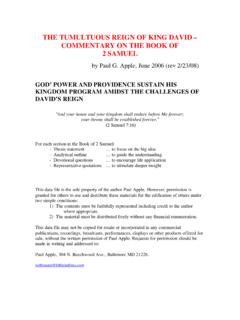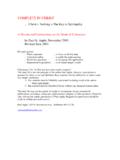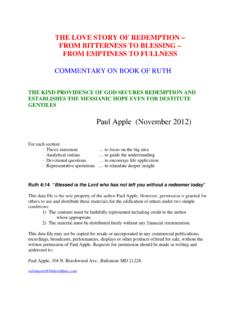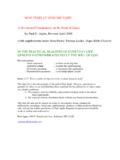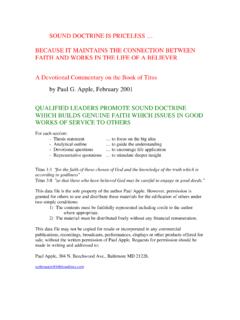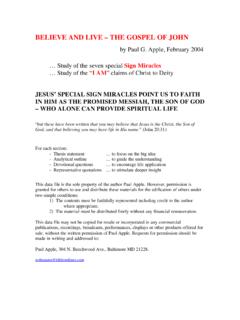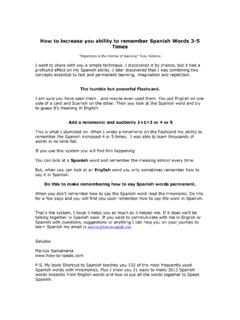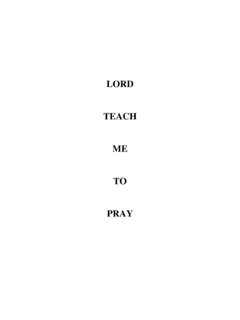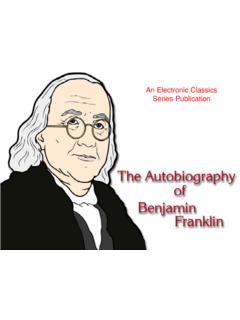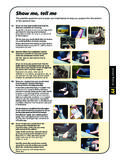Transcription of IN WRATH REMEMBER MERCY . . . THE JUST …
1 IN WRATH REMEMBER MERCY .. THE just SHALL LIVE BY FAITH -- COMMENTARY ON THE BOOK OF HABAKKUK by Paul G. Apple, December 2006 THE LONG TERM CONVICTION OF FAITH EXULTS IN THE GOD OF OUR SALVATION DESPITE THE PERPLEXING QUESTIONS OF THE PAIN AND APPARENT INJUSTICE OF OUR PRESENT CIRCUMSTANCES In WRATH REMEMBER MERCY . The just shall live by faith. (Habakkuk 3:2; 2:4) For each section in the Book of Habakkuk: - Thesis statement .. to focus on the big idea - Analytical outline .. to guide the understanding - Devotional questions .. to encourage life application - Representative quotations.
2 To stimulate deeper insight This data file is the sole property of the author Paul Apple. However, permission is granted for others to use and distribute these materials for the edification of others under two simple conditions: 1) The contents must be faithfully represented including credit to the author where appropriate. 2) The material must be distributed freely without any financial remuneration. This data file may not be copied for resale or incorporated in any commercial publications, recordings, broadcasts, performances, displays or other products offered for sale, without the written permission of Paul Apple.
3 Requests for permission should be made in writing and addressed to: Paul Apple, 304 N. Beechwood Ave., Baltimore MD 21228. ABOUT THE AUTHOR Paul majored in English at Princeton University and graduated in 1979 with a Master of Divinity degree from Grace Theological Seminary in Winona Lake, IN. He lives in the Baltimore area with his wife Karen. He has worked in management roles for several local companies while engaging in pastoring and preaching responsibilities at Solid Rock Community Church. His four children (and one daughter in law) enjoy a wide range of educational and professional pursuits while sharing in common a love for the Lord Jesus.
4 BACKGROUND OF BOOK OF HABAKKUK Malick: The surprising judgment which the Lord is going to bring upon wicked Judah through the evil, idolatrous Babylonians does not compromise His goodness, but engenders faith because He will one day also judge the Babylonians and deliver His people as their mighty warrior Stedman: The prophet Habakkuk was a contemporary of the prophet Jeremiah, who is known to us as the weeping prophet, because he ministered to the Southern Kingdom of Judah in the darkest days of its national history, just before the Babylonians sacked Jerusalem and carried the people into captivity. Habakkuk (his name means, "the embracer") also was in Jerusalem at that time, so he too saw all that went on.
5 Piper: The situation which Habakkuk faces is the imminent invasion of the southern kingdom of Judah by the Chaldeans (who are the same as the Babylonians). This invasion eventually happened at the end of the sixth century and Jerusalem fell to Nebuchadnezzar in 586 The Lord revealed to Habakkuk beforehand that Judah was going to be punished for her sin by the Chaldeans. Unlike Joel and Zephaniah and Amos, Habakkuk does not even mention the possibility that destruction could be averted. He does not call for national repentance. It is too late. Instead, he predicts the destruction of Judah and beyond that the doom of the Chaldeans themselves.
6 And he promises that the only way to preserve your life through the judgment is by faith. So even though destruction is decreed for the nation, there is hope for individuals who hold fast their confidence in God. Luther: His name speaks as one who took his nation to his heart, comforted it and held it up, as one embraces and presses to his bosom a poor weeping child, calming and consoling it with good hope." McGee: This little book opens in gloom and closes in glory. It begins with a question mark and closes with an exclamation point. Habakkuk is a big WHY? Why God permits evil is a question that every thoughtful mind has faced.
7 I think that this book is the answer to that question. Will God straighten out the injustice of the world? This book answers that question. Is God doing anything about the wrongs of the world? This book says that He is. In my opinion it is possible to reduce the doubt of Thomas in the New Testament, of Habakkuk in the Old Testament, and of modern man into the one word: Why? It is the fundamental question of the human race. OUTLINE: I. PERPLEXITY of the Prophet (Chap. 1) 1. First Problem of the Prophet, 1:1-4 Why does God permit evil? 2. God s Answer, 1:5-11 God was raising up Chaldeans to punish Judah ( ) 3.
8 Second Problem of the Prophet (greater than the first), 1:12-17 Why would God permit His people to be punished by a nation more wicked than they? Why did He not destroy the Chaldeans? II. PERCEPTION of the Prophet (Chap. 2) 1. Practice of the Prophet, 2:1 He took the secret problem to the secret place. 2. Patience of the Prophet, 2:2,3 He waited for the vision. 3. Pageant for the Prophet, 2:4 The great divide in humanity: One group, which is crooked, is flowing toward destruction; the other group, by faith, is moving toward God. This is inevitable. 4. Parable to the Prophet, 2:5-20 The application is self-evident from the vision.
9 The Chaldeans, in turn, would be destroyed. God was moving among the nations. III. PLEASURE of the Prophet (Chap. 3) 1. Prayer of the Prophet, 3:1,2 The prophet, who thought God was doing nothing about evil, now asks Him to REMEMBER to be merciful. Was he afraid that God was doing too much? 2. Program of God, 3:3-17 God rides majestically in His own chariot of salvation ( ) 3. Position of the Prophet, 3:18-19 He will rejoice (v. 18). He has come from pain to pleasure. McGee: In the book of Judges there is put down a great principle of government, a principle which is also stated very clearly in the prophecy of Isaiah.
10 All of the subsequent prophets simply bear out and apply this principle which has already been stated. The principle is this: There are three steps in the downfall of a nation. First of all, there is religious apostasy. The second step is moral awfulness. And the third step is political anarchy. These are the three steps by which nations pass off the stage of human history. That has always been the way that it has moved. You see, the primary problem never was political anarchy. The primary problem never was moral awfulness. As bad as these are, the root problem goes back to religious or spiritual apostasy, a turning away from the living and true God.
